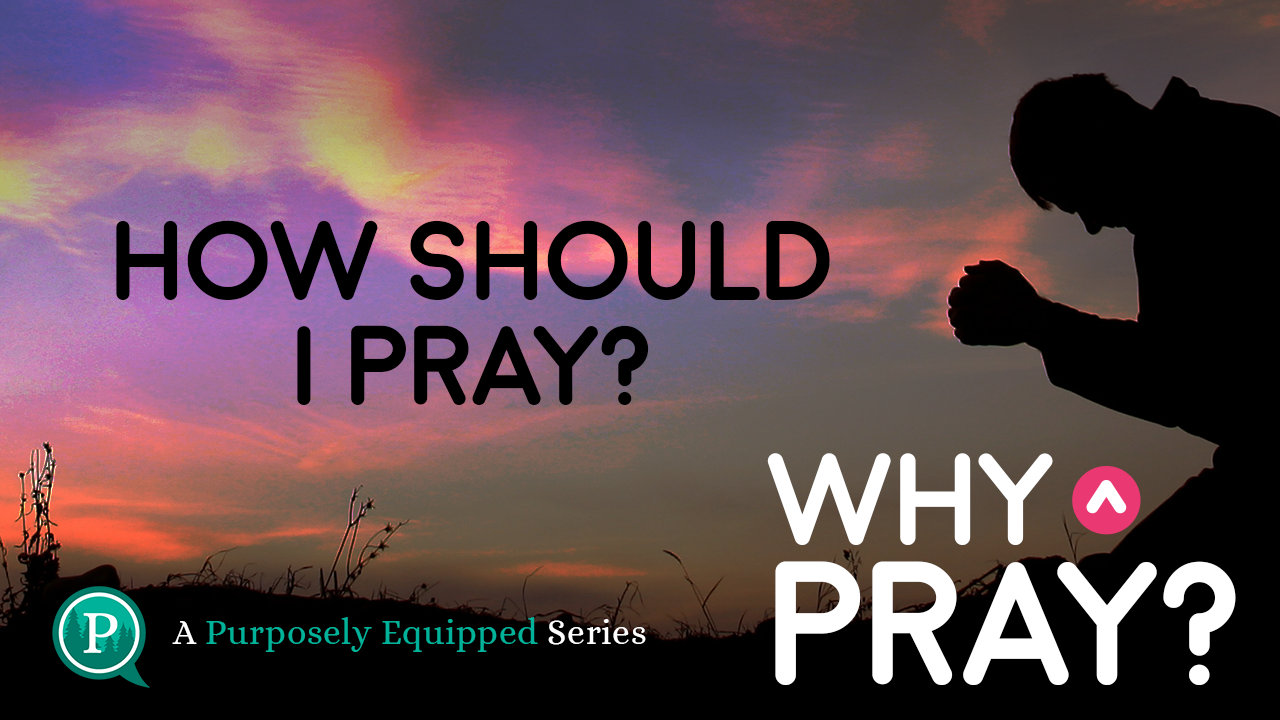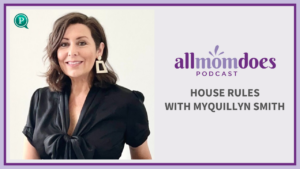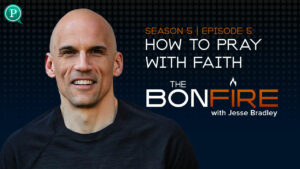We are in the third part of our prayer series looking at “How should I pray?” This is where the rubber meets the road as we look at the many ways people pray, how we keep it authentic and how to get started in your own life.
Show Links:
- Wyatt Martin
- Steve Brooks
- Alderwood Community Church
- Church Podcast: Native Exiles
- Book Mention: The Ruthless Elimination of Hurry: How to Stay Emotionally Healthy and Spiritually Alive in the Chaos of the Modern World
Transcription:
Narrator: Purposely. Your life. God’s purpose. Listen at onpurposely.com.
Narrator: Welcome to Purposely Equipped. We want to help you go deeper in your faith by learning truth from the Bible. Our new series, Why Pray?, will help us discover what the Bible has to say about the importance of prayer in building our relationship with Jesus. Pastors Wyatt Martin and Steve Brooks from Alderwood Community Church, will be helping us with this five-episode series as we look at Why Pray?
Wyatt Martin: Steve, I’m excited about this episode. We’ve talked about what prayer is. We’ve talked about why to pray. Today we’re talking about how we pray, and this I think is really kind of where the rubber hits the road, like you know, somebody who is trying to follow Jesus; wants to grow in their prayer life; like, okay, what do I like? What do I do? How, how do we do this? I mean, what comes to your mind as you think about that?
Steve Brooks: I’ve been a Christian for a lot of my life, and I’ve been in a lot of different settings, and you hear people pray in so many different ways, right? Some people are super somber. Some people are introspective. Some people are exuberant and joyful. I remember when I was growing up, my grandparents were just wonderful, godly people. But my grandfather, he somehow learned to pray in King James language, thee’s and thou’s. You know, big, long words, which was interesting because he had a sixth-grade education and he had grown up in the Hills of Tennessee.
Wyatt Martin: Yeah. He wasn’t speaking that way in any other context?
Steve Brooks: No. So, it stood out even as a young kid, you know, and I thought for many years, that, that, that just must be the right way to pray. You had to have like the secret code words or something. Yeah. It wasn’t pretentious on his part, but it was just how he just, how he saw to pray.
Wyatt Martin: And I, we all have that to some degree. I mean, there is some kind of formula that was, has been handed to you, whether it’s…I remember one for a long time in my circles was starting every prayer, “Dear God, thank you for this day.” It didn’t matter what you were talking about. It always had to start thank you for this day.
And I, so sometimes that’s what we think about when we think about how we pray. Okay. What is the formula? What is the language? What prayer voice do I use? And, you know, do we say amen at the end, every time in Jesus, in Jesus’ name, in Jesus precious name? Yes. I, you know, and these things just become habits. And I, when we think about how to pray, I actually really want to kind of break that model of thinking about the question, even. It isn’t. A formula. It isn’t about a, a style or a, a language. You know, I, we can go on this theme of, this is about relationship with God. This is about a father child relationship that Jesus teaches us.
So, if you ask the question, okay, how do I speak to a loved one? and somebody was giving you like a formula, you know, if like I’m married and, you know, If I asked about how do I speak to my wife and I, I started every interaction between the two of us with the same formula or ended it the same way.
Steve Brooks: Thank you for this day.
Wyatt Martin: Yeah. I mean, it would freak her out. I mean, it would be so weird because real relationships aren’t that way. Right? Real relationships. They’re natural. They’re authentic. And so, thinking about how to pray, I mean, I would, I would kind of start there. Think about how you would talk to somebody that you care deeply about and start talking to God that way and go from there. But we need to get a little bit more into the, the kind of nitty gritty of this, because sometimes we talk about like prayer, like it’s super easy. Right. And it just isn’t.
Steve Brooks: It, it is not, that’s a great point. I mean to me in this respect, it’s a little bit like when people really want to learn how to read their Bibles, you know? I think one of the mistakes that you can make is just thinking, Hey, it’s going to be easy. Cuz somebody tells you I have my quiet time every day and I just feel so good. Or I just spent, you know, an hour with the Lord and it was just so wonderful. Like prayer and time with the Lord is just so easy.
Some days it is. Some days it’s really hard. I don’t know why it, I mean, over the years and, and this is interesting, because I’ve been a pastor for 20 plus years. I can’t tell you the number of pastors, not just people, who’ve known Jesus for a long time, but pastors who have shared with me behind closed doors, the one area in my life spiritually that I struggle most with is prayer.
Wyatt Martin: Yeah. Yeah. And there’s a lot of reasons for that. One is I think. Prayer exercises, some muscles that for many of us have atrophied. Muscles like attention span and just being able to be quiet alone with your own thoughts, let alone with the Lord. I, one of my favorite social experiments that’s happened in the last 10 years is they brought people in and they told ’em that, that they were going to be doing a study on pain tolerance. But in reality, they were doing a study on attention span. On actually being alone in a room. Right. So, they, what they did is they hooked people up to this pain machine that gave ’em a shock and they, and they tested on it.
They hooked ’em up. It was a painful shock. Then they asked them how much money would you be willing to pay to not be shocked again. And everybody said some amount of money. Everybody’s like I would pay $5. I would pay $10, whatever. And they said, okay, great. Give us a second. We’ll be right back. And they left them alone in the room with nothing to do, but they’re still hooked up to the shocking machine and they leave them in there for 20 minutes. Like 70% of people eventually will get so bored in that room that they will start shocking themselves again, just to be able to do something. Like that’s how uncomfortable most of us are just being alone with our thoughts and nothing else to do. And that makes prayer difficult because that is kind of the starting place for prayer, is that you have to be able to be quiet, quiet, physically, quiet in your own mind to remove distractions, to bring your attention to God… and that’s something that in the modern world, just most of us are not very good at.
Steve Brooks: I mean, we have whole industries that are devoted to completely dominating our attention. If you are a website, if you are, you know, a, a streaming… I mean, everyone wants to capture our attention, and there’s so many voices and options trying to do it.
Wyatt Martin: And that’s how most of us live our lives. You wake up. The first thing that most people do in the morning is grab their smartphone off of the charger. So, from second one in the morning, you’re already engaging your brain with the whole world outside of you. You’re opening up the, you know, front page of your favorite news site, or you’re scroll through your email or your open up Instagram or whatever.
So, your brain’s automatically going. And you know, you do your morning routine. Some people have a podcast in their ears as they’re doing that, you’re having a conversation with your family. You’re in the car. Now you have music going, or another podcast. You get to work. You start talking to people, podcasts on the way home, you know, hanging out with your family.
Netflix is on until you get too tired to stay awake and then you go to sleep. And there, and that whole day there hasn’t been any moment at all of quiet. Of just turning off the input into your mind in order to reflect, in order to pray, in order to bring your attention to outside of your current moment. And we’ve trained our brains so well, that way that many of us are actually addicted to that.
Like there’s an, an actual kind of emotional pain you feel by not having something to entertain yourself with. And so, that’s why you see, I mean, if you’re ever around crowds, I mean, just watch what happens in doctor’s offices, in elevators, in, I mean, in any moment where there’s nothing happening, people just reflexively will take their smartphone out of their pocket and start looking at it. Not to, not for anything in particular, but just like something to distract me from this moment of silence.
Steve Brooks: You know, I constantly get mocked cuz I’m like the only person on staff that has an Android phone. Yes. But the one thing on my Android phone that I do when I’m sitting in the line at the grocery store, is if I just go to my home screen and like swipe one to the left, it’s like, Steve’s random info page from Google and they just know what I want to read about, you know? And there’s 50 articles that can distract me all day long. That is the culture we live in. It’s like salty and sweet foods. Right? Like you eat those, and it just makes you more hungry. You, you can’t hardly control this appetite.
Wyatt Martin: Yeah. So how do we pray? Step one, you have got to start fighting this battle. Most of you probably aren’t even in the fight yet. You haven’t even realized that this is a great spiritual battle that’s going on for your attention. And so, step one is building some sort of habit in your life of a alone. Of quiet of solitude. And this is something we learn from Jesus.
Steve Brooks: Yeah. I I’m looking at it right now that just preceding Jesus’ teaching on the Lord’s prayer he says, when you pray, go into your room, close the door and shock yourself. No, he doesn’t say that. says close the door and pray to your father who is unseen. This is tremendously hard for modern people like us.
Wyatt Martin: Yeah. In Jesus practice it. He didn’t have a home. He didn’t have a room to go into, but he would go alone and be in solitude. He would leave the disciples. He would go up to the mountaintop to pray, to be alone. And and so, that’s, that is really step one. And it’s going to be painful in the beginning. It’s not going to be easy.
I really recognize that this was a huge hang-up for me in my spiritual growth in my life was just technology constantly getting my attention, and just realized how bad my prayer life was because of it. You know, I had some intentional moments throughout the day of prayer, but really felt to me like the second I, I left my house in the morning, I didn’t even think about God again until you know, some moment maybe before we go to bed. I mean, and you know, my job as, as a pastor, so I’m studying the scriptures and I’m preparing messages, but I mean, moments of just spontaneous in the day, bringing my attention to God, asking him, to teach me, asking him, to show me what he has for me to do, like that those moments just weren’t happening because they were being drowned out by technology.
And so, a few years ago, when I was getting ready to take my sabbatical, I decided this was one of the things that I really wanted to reexamine. And so, I decided that part of our sabbaticals are going to take four weeks of vacation in the Cook Islands and I was not going to bring any electronic device with me whatsoever. And I mean that. I didn’t bring my cell phone. Didn’t bring my iPad. There was no computer. The only electronic device that I had was an old school Kindle, that was literally just an e-reader. No web, no nothing. Right. I was like four weeks. I’m just going to detox and. it was actually really transformational for me. It ended up being more transformation than I wanted it to be because those four weeks became nine weeks when COVID happened. And our flight home got canceled and we got stranded at the Cook Islands.
Steve Brooks: We all felt terrible for you.
Wyatt Martin: Yeah. Stuck in. Yeah. So cry me, you know, cry me a river. But what that meant was nine weeks of digital silence. No text messages. No phone calls. No, no browsing the internet. No nothing. And what that taught me was that this inability we have to be quiet before the Lord, it is very changeable. Yeah. I mean, within, within a week of being in the Cook Islands with nothing, my spiritual imagination was being reawakened. My attention span with God was being lengthened significantly. You know, it really very quickly. It was not hard for me to sit down for an hour for two hours with God, with my Bible open with my journal in front of me. I, I began to enjoy that time and long for that time. And, and so I, you know, I say that just to encourage people that if you find prayer very difficult because you just, you can’t focus long enough, and you, and, and you get bored and your mind’s distracted with other things, it doesn’t have to be that way forever. If you change some of your habits, you really will see God work in your heart and your mind. And, and this, this becomes an easier habit to put in place.
Steve Brooks: But this gets back to what we were saying earlier. I think, you know, people get disillusioned with prayer because they think it should just come so easily, and it should always just be this Placid, you know, life giving experience, and it, and it does take work and it does take discipline. And, you know, I, one of the questions people ask me a lot is, you know, do you think it’s really important to pray in the morning because we always see Jesus almost always rose early to go and pray.
I’m a morning person. So, that’s really easy for me to answer. I can’t make it legalistic, but I mean, the best time of my day when my mind is most fresh, and my imagination is just most open, is when I get out of bed. And so, I try to set aside that time and when I try to pray, sometimes it takes me 20 minutes just to get my head into my heart in the right place, to where I can even hear from God and want to desire God. So, we need discipline. It takes some work.
Wyatt Martin: Yeah, I do, I mean, the question in the morning is a really interesting one. I’ve been all over the map on this one. I’m not a morning person at all. I hate the mornings. I’m not fully awake until about 10:00 AM. And, and so. , you know, I, and I really do think it’s true that God desires our time. He desires our best. That doesn’t necessarily mean the morning. I don’t think there’s any scripture that commands that. I mean, Jesus and I do it in the morning. Jesus Steve, both the morning. I remember it was funny. I as kind of spiritual mentor and, and supervisor named Tim Walden that you know, well, We used to be on staff together here at Alderwood.
And I mean, he was kind of like the spiritual Chuck Norris for us. You know, everybody looked up to him as the example of following Jesus and, and he was a guy who got up really early in the morning and spent a long time with the Lord. And I was a young person on staff, and I was really trying to figure out this prayer life. And I, you know, I was miserable getting up in the morning. And so, I finally went to Tim. I said, Tim, would you help me? I mean, How, how did you get to where you are? Like, teach me. How do I become somebody who wakes up early and spends these long periods of time with God? And Tim’s response to me was, yeah, just, I wouldn’t even try. It blew me away.
It was so funny. I mean, you could have blown me over the feather. I was shocked. His point though, was that the ideal isn’t, you know, some prescriptive moment in time. The ideal is when you can give full of yourself to God. Okay. That being said, that was Tim’s response. I’ve tried a lot of different things in my life morning, afternoon, evening, before bed, whatever.
There really is something about the morning. I don’t know what it is exactly. I think part of it is your brain hasn’t kicked into the gear of thinking about all the conflict and all the things going on in your life. Yeah. And all the things you have to do. Like there’s a, there’s a freshness in the morning and, and I will say this, church history speaks pretty loudly on this one in my mind. You cannot find anyone in church history worth reading about any Saint, any church father, any, you know, anybody that we know of in church history, who is still worth remembering, who did not have a time of prayer in the morning, every day.
Steve Brooks: I rest my case.
Wyatt Martin: They just, they don’t exist for sealing that for me.
Steve Brooks: So again, it doesn’t mean it. It’s not legalistic. It doesn’t mean. God’s mad at you if you don’t do that. Totally. But there is just, I think some wisdom. Yeah.
Wyatt Martin: And the wider point that we’re both trying to make here is, I mean, we’re both fans of John Mark Comer, who’s written a great book, The Ruthless Elimination of Hurry, and one of the things he talks about often that has really made an impression I know on you and me is just living the way of Jesus. We can’t expect to not have some lifestyle changes if we’re going to follow Jesus, including making time and space for Jesus. Yeah. And for time with God. So, I think it’s really important to create those disciplines. It’s hard though. It’s really hard. It is.
Steve Brooks: But yeah, I think, you know, one of the things I would say is schedule it. I think most people don’t pray because they don’t have a plan to pray. You know, the idea is like, I’ll just pray when I think of it when I get to it. Right. Whatever your time’s going to be, if it’s the morning. Put it on your calendar. Don’t let anything get on top of it. If it’s not working, try a different time. If you don’t plan a moment to be able to shut off everything else, those moments don’t come.
Wyatt Martin: Absolutely. And we want to be realistic and merciful too. I mean, I think of my wife when she was home with our two daughters, raising them and just, you know, took more of the brunt of that than me, how hard it was. She would share it. Just frustrating. I hardly have any time with God. You know, one of the ways I, as a husband could help her with that was just to create downtime for her. But I think God is merciful too. I mean, for somebody who works, you know, 12-hour shifts or something. There’s leeway. Yeah. But the point is it doesn’t, it’s not going to come easy.
Steve Brooks: Yeah. So, let’s get kind of into the weeds a little bit here. I mean, how some, let’s say somebody’s listening to this say I don’t have any habit of praying in my life at all. I’m hearing you talk about this. I want, I desire more. What should I do? How, how should I go about this? What, where would you have somebody start?
Wyatt Martin: I’d start in the Psalms, actually. The Psalms are the recorded prayers of God’s people. I mean, there are many other places in the Bible we find those prayers, but the Psalms are 150 separate verses of prayers. And one of the things that just so jumps out at me when you go to the Psalms is how you know, we talked earlier about the importance of just coming to God with natural language.
I mean, we could say even being yourself, some of the rawness of the Psalms, I preached a sermon. I remember like 15 years ago on Psalm 88, which someone calls the basement Psalm, because it is just a picture of someone whose life is completely in the basement. I mean, I’ll read a little bit of you of it for you. This is David. He says, I cry out to you for help Lord. In the morning, my prayer comes before you. Why do you reject me? And hide your face from me. From my youth I’ve suffered and been close to death. Your terrors have destroyed me. All day long, they surround me. They completely engulfed me. You have taken from me, my friends and my neighbor’s, darkness is my closest friend.
Hmm. This is actually a really unique Psalm. It’s one of only two Psalms that ends on a really negative note. In fact, in the Hebrew, the last word is dark. Wow. I mean, but I, I preached this like 15 years ago and just reminded people that God even gives us words and a voice for those darkest moments. This Psalm is not necessarily theologically, correct. The point is it gives us words. So, Psalms is one place that really urge people to go.
Steve Brooks: Yeah. So let God’s words to us and the Psalms be the words that you pray back to him. I think that’s one of the ways that you can learn to speak to God in the whole variety of the human experiences or the Psalms. And that’s great.
Wyatt Martin: And insert your circumstances and your feelings and your words but let ’em be a guide.
Steve Brooks: Yeah. I mean, if somebody’s starting from scratch, I think what I would say is one, take a step forward. Don’t try to implement the ideal prayer life in one go. Like, think about what the next step is for you.
So, here’s what I mean, because like, I don’t, I never pray. I never think about it. I wouldn’t advise, not saying like, okay, starting Monday, I’m getting up at 4:00 AM and I’m going to be praying for three hours, seven days a week. And you know, I’m, it’s just, it’s just not going to happen. You know, it’s just, it’s unrealistic.
You’re setting yourself up for failure. I would say. Why don’t you pick a time that works for you on Saturday? Get an hour. And on Saturday morning after you’ve had your cup of coffee, didn’t wake up very early, open your Bible and just commit an hour to be with God, and find a, find a way to get away from your family to get away from your distractions, and so that means implementing what we call the spiritual discipline of airplane mode. So, turning your phone off, being unavailable to the world and just have a Bible open in front of you. Have a journal open and read a Psalm and then try to just spend some time speaking your heart, and what this Psalm is, is communicating to you and speaking to you to God.
And as you, as you recognize your mind, wandering, don’t feel bad about it. Just keep on trying to come back to a conversation with God, to talk about what’s going on in your life. The Journal’s really helpful in my mind, to write out prayers to God, to one of the things that’s actually helpful for me in is, it’s funny when I, when I have a moment to pray, when I’m trying to kind of clear my mind of distractions. That’s when you remember the really important thing that you had forgotten it, floods, you know? Yes. And so having journalist I’m, I’m going to write this down, I’ll come back to it later. Yeah. And then, you know, it can be helpful to have something to guide you in how you speak to God. And that’s where it’s just a really simple model that we’ve taught a number of times at Alderwood and I found to be helpful is acts, A C T S, four things about prayer, adoration, confession, Thanksgiving, supplication, which just means asking. So, adoration start by just expressing your adoration for God. What you love about him, what you’re grateful for you know, at some point, move on to confession, to saying the things that you know, that you done wrong that you need forgiveness for. That you need God’s mercy for, and, you know, ask God to, to forgive you, your sins, you know, move on to Thanksgiving. What are you thankful for that God’s done in your life? What can you give him the praise for? And that honestly is just an amazing exercise and, and a great thing to journal. To write down the things that God has done for you that you’re. Thankful for that you can come back to in a, in a dark moment and say, man, God really has been good to me.
And finally, moving on to supplication. What are you going to ask God for? What do you need right now? And just even having that model can be something that can help your mind, not wander as much as you pray. That’s not by the way a perfect thing. That’s not something to use all the time necessarily, but it can’t be a helpful place to start, I think.
Wyatt Martin: Getting started is the most important part.
Steve Brooks: Yeah. So yeah. I mean, maybe we can end there. How do you pray? Start just start, and know that you’ll learn as you go, God will work in your heart and mind, and it’ll change different seasons but make that commitment to block some time and spend time with the Lord.
Narrator: Again, special thanks to our hosts for this series, Wyatt Martin and Steve Brooks from Alderwood Community Church. Don’t forget to follow their podcast, native exiles, in any podcast app, or go to native exiles.com, where they look at living as everyday followers of Christ in the world today. If you are looking for a church to call home, check out Alderwood at alderwood.cc.
Thank you for downloading, Why Pray?, a Purposely Equipped series. Let’s keep growing in our faith together. Purposely Equipped is part of Purposely, a podcast network with practical podcasts to help you find, and live, in God’s purpose for your life. Find more podcasts and faith resources at onpurposely.com.







